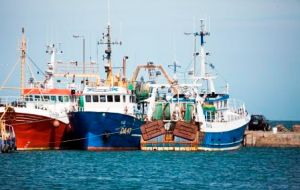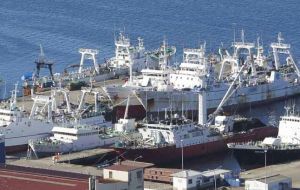MercoPress. South Atlantic News Agency
EU fishing fleet: balance between capacity and fishing opportunities still distant
 On 31 December 2012 the EU fleet consisted of 76,023 vessels.
On 31 December 2012 the EU fleet consisted of 76,023 vessels. The European Commission's annual report on the European fishing fleet shows some progress towards achieving a balance between capacity and available fishing opportunities. However more remains to be done to ensure that stocks are managed in accordance with the objective of Maximum Sustainable Yield (MSY) and the Commission considers that there is still a need for active fleet capacity adjustment measures by Member States in order to achieve this.
The main messages of the report are:
Current entries in the EU Fleet Register indicate that all Member States have complied with the levels of fishing capacity in tonnage and power. Overall the fishing capacity of the EU fleet was 16.4% below the capacity ceilings for tonnage and 10.4% below the power ceilings.
On 31 December 2012 the EU fleet consisted of 76,023 vessels. The number of vessels has been reduced by 1.6% while the tonnage and engine power decreased by 2% and 1%, respectively in comparison with 2011.
In 2012 decommissioning with public aid was the most used management tool to reduce fishing capacity. From 1 January 2007 until 31 of July of 2012, EUR 464 million of European Fisheries Fund payments were allocated, equating to almost 3,700 vessels ceasing fishing.
Excessive fishing power is a major driver for overfishing. The recent reform of the EU's Common Fisheries Policy (CFP) obliges Member States to adjust the fishing capacity of their fleets to their fishing opportunities over time.
From now on, Member States will have to include in their reports an action plan for the fleet segments with identified structural imbalance. The action plans will result in more transparency and monitoring on the Member States' targets, actions, and timelines to remedy these imbalances. Under the new CFP a proven lack of commitment from Member States to achieving a balance between fleet capacity and fishing opportunities may lead to the suspension or interruption of funding under the new European Maritime and Fisheries Fund.
The annual fleet report is based on Member States’ reports on their efforts to achieve a sustainable balance between fishing capacity and fishing opportunities. Member States are responsible for achieving a stable and enduring balance between the fishing capacity of their fleet and their fishing opportunities, and to take appropriate measures to ensure this balance. This has been a requirement under the Common Fisheries Policy since 2002 and is continued in the new CFP as adopted in December 2013.
The indicators used for this report are related to the sustainable and viable operation of fishing fleets, such as whether fleets: Rely on stocks fished above MSY levels; Affect stocks at high biological risk; Are breaking even; Are economically sustainable; Are under-utilized; Are inactive. (FIS/MP).-





Top Comments
Disclaimer & comment rules-

-

-

Read all commentsAs the UK has downsized it's fleet off it's own bat and then got hit by EU's fisheries policies which decimated them even more, it's time the Spanish took the major share of decommissioning.
May 01st, 2014 - 12:32 pm 0The local vessels involved in the Clyde area are small with crews of 4/5 and land their catches at Troon-the only viable port left.
I can remember in my town,about 40 years ago, a healthy fishing industry with a market and dozens of vessels engaged in the inshore Clyde area.
Now the fishing market has closed and yuppy flats have been built on the site. There are only two ports left with about 20 vessels involved, covering a coastline of 90 miles.
Off the Scottish West Atlantic coasts there appear to be Armadas of large Spanish fishing vessels hoovering up everything they can catch.
As far as I know, they are frozen and landed back in Spain...no benefit to the UK economy.
We would be better following the Iceland/Faroes model.
Do they really need 76,000.
May 01st, 2014 - 12:46 pm 0we should withdraw and tell the Spanish to fish elsewhere.
How did it get this bad for the UK fleet?
May 01st, 2014 - 03:01 pm 0Commenting for this story is now closed.
If you have a Facebook account, become a fan and comment on our Facebook Page!